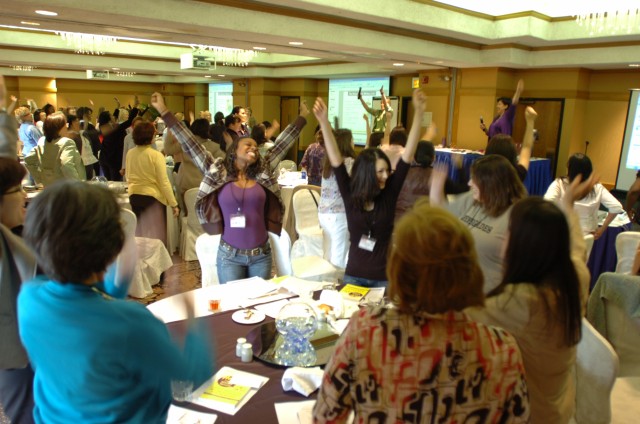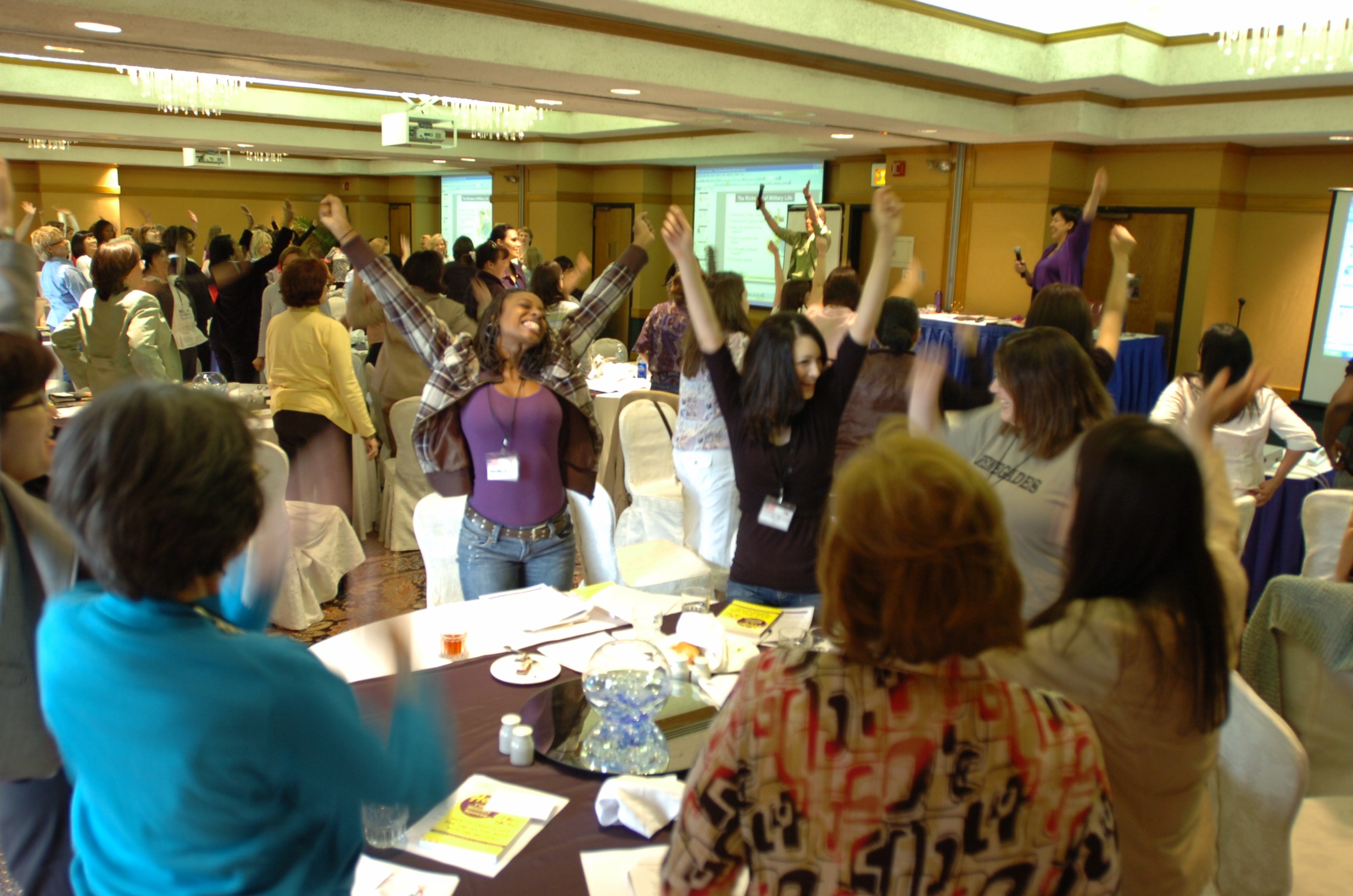Spouses from across the 2nd Infantry Division learned strategies to not just survive, but to thrive as members of the Army Family during a 2ID Family Readiness Group sponsored workshop held at the Dragon Hill Lodge on USAG-Yongsan, April 30.
The opportunity to pool the collective experience of the Warrior Division's novice and seasoned spouses was facilitated by Kathie Hightower and Holly Scherer, two authors and military spouses, who are answering their call to duty by helping military spouses thrive.
The presenters guided 130 2ID spouses and friends of 2ID through the four-hour interactive workshop, "Follow Your Dreams while You Follow the Military," which included games, prizes, and energy creation techniques, among other activities.
The guests from all of 2ID's major posts received complimentary copies of the coauthors' book appropriately entitled "Help! I'm a Military Spouse, I Get a Life Too!: How to Craft a Life for YOU as YOU Move with the Military"
Before the event kicked off, the 2ID commanding general spoke of the workshop's merits.
"It is a lot of fun just to pull spouses together from across the 2ID footprint for some great Family-focused training that will really help our Soldiers," said Maj. Gen. John W. Morgan III.
Morgan told the spouses that Servicemembers in Korea, especially the Soldiers of 2ID, would feel the transition as USFK undergoes transformation and tour normalization over the coming years. He said a big part of the transition will be the move of most Soldiers and their Families from Area 1 in the north to Area 3, which is south of Seoul, in the coming years.
Morgan's better half, Debbie Morgan, who not only attended the event, but was almost singlehandedly responsible for the workshop reaching 2ID said it was important for all Army spouses to know they're not alone. "We do care. It's important. You can do this," Mrs. Morgan said succinctly summing up her feelings.
Prior to the workshop Marlese Burrowes, wife of 2ID command sergeant major, Command Sgt. Maj. Peter D. Burrowes, said the whole thing was new to her.
"I've never attended one of these workshops, but I'm excited about being here," she said.
Afterward, Mrs. Burrowes thought the workshop was well worth it.
"As a military spouse with 24 years, you think you have the military lifestyle down pat. But being here at the workshop with these young spouses I've heard fresh ideas. After reading the book and going through the workshop, my creative thoughts have been trigged" she said.
According to the workshop, it really is possible to thrive as the spouse of a Servicemember. Scherer and Hightower, not only say it's possible; they're living examples of their message's power.
However, things weren't always so grand for either presenter. Throughout the workshop, the two shared many anecdotes from their more than 50 years of collective experience as Army spouses.
Scherer said it's not only the Soldier who starts a new life upon swearing an oath to the Constitution; it's also a Family obligation that has serious ramifications.
"I did not realize I would be marrying into a new lifestyle," she said.
Now the 26-year military spouse is helping others in her former predicament move forward in life while supporting their Servicemember. Scherer said military spouses have four choices: divorce, convince their loved one to get out, remain angry or change their approach and attitude toward living as a military spouse. Naturally, the workshop focused on the latter.
Hightower took a different route to the role of military spouse. In fact, she served in the Army before transitioning to an equally challenging endeavor out of uniform, but still in the military community.
"Being in the military and being married to the military are two entirely different things," she said. "We face more challenges as military spouses than most people will face in a lifetime."
Those challenges, which are unique to military spouses, are what caused Hightower's unhappiness, or so she thought.
"I was one of those spouses who complained for the first seven years. I finally realized I had to make changes," she said.
And change her attitude she did. By researching what makes people happy and then applying those findings to military spouses' conundrum, Hightower along with her friend Scherer, founded the principles of their now trademarked presentation, "Follow Your Dreams: While You Follow the Military."
The dynamic duo identified five keys to happiness as a military spouse: support, faith, simple joys, knowing what a person wants while engaging in life and using strengths for the greater good.
A big part of success as a military spouse has to do with relating to those facing the same challenges - other military spouses, they said.
Having a strong bond with other spouses for support is important, but an unbreakable bond with the uniformed partner is even more critical to a healthy military Family, they said.
"You know how to treat your best friend. Treat your spouse that way," Hightower said.
"Build on the strengths, don't magnify the weaknesses," Scherer said.
At one point they asked the audience to ponder a simple, but telling question. "What would it be like to be married to me'" After a knowing collective laugh the participants wrote the question down on a note card. They were told to take it home and place it on their mirrors as constant reminders of the proverbial golden rule.
The workshop was especially beneficial to the young 2ID spouses residing in Area 1.
Myra Sommer, 26, who got more out of the workshop than she expected, is just one example.
"I'm learning a lot about how to avoid stressing out and how to have a lot more energy. I love it. said Sommer, who's been married for two years to a specialist assigned to Headquarters and Headquarters Company, 2nd Battalion, 9th Infantry Regiment, 1st Heavy Brigade Combat Team, 2ID.
Sommer said the workshop caused a shift in her way of thinking about the military.
"It helps to strengthen the Family. Instead of looking at the bad stuff, I'm focusing on how hard he's working," she said
Sommer was not the only 2ID spouse who sang the praises of the workshop.
Emily McDonald, 21, also felt the workshop made a difference.
"A lot of the workshop covered dealing with stress and healthy communication with your husband," said McDonald, a Family Readiness Support Assistant.
McDonald said the workshop achieved its purpose.
"It brings military spouses together and helps them cope and deal with the Army," said McDonald, the wife of a specialist assigned to 115th Field Artillery Regiment, 1st HBCT, 2ID.
"You really have to make good friends and stay close to them," she said, echoing some of the workshop's advice. "I thought it would be very hard. Now that I've been here and things have changed for the Families, we've decided to stay here."
Things have also changed since the United States Forces Korea commander, Gen. Walter L. Sharp, extended the offer of Command Sponsorship to all Families serving in Area 1.
No longer do Families like the McDonalds have to separate for one year. Thanks to the change in policy, the McDonalds celebrated their wedding anniversary together in Korea. Although the McDonald Family came to Korea non-Command Sponsored, the 2ID Soldier and spouse decided to extend for another year under the Assignment Incentive Program and recently applied for the Command Sponsorship Program.
For McDonald, Sommer and the other 128 attendees, the workshop was an opportunity to learn from two experts - Scherer and Hightower - in the field of service to country as military spouses.


Social Sharing